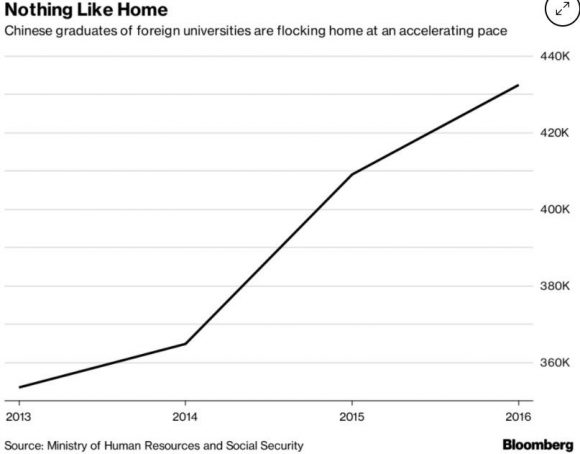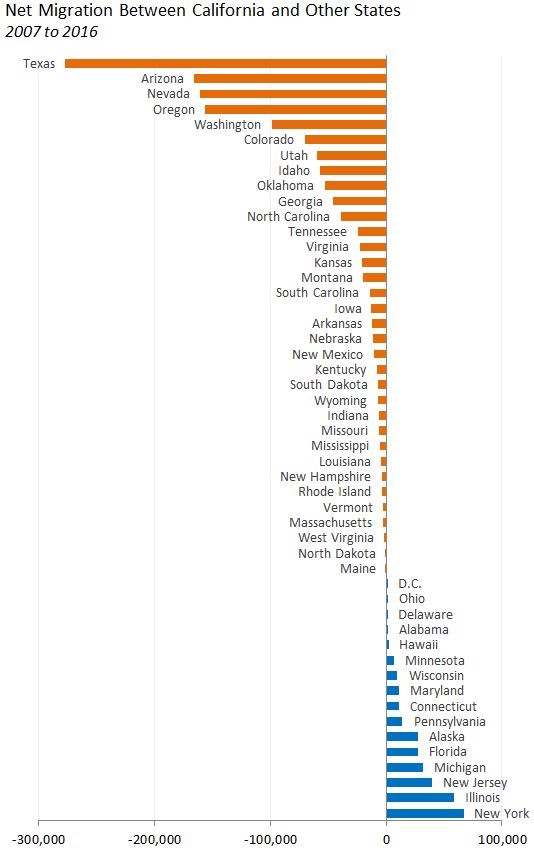The High Cost of Driving Out Our Foreign Technologists
There is only so much juice you can squeeze from a lemon before nothing is left.
Silicon Valley has been focused mainly on squeezing the juice out of the Internet for the past 30 years with intense focus on the American consumer.
In an era of minimal regulation, companies grew at breakneck speeds right into families' living quarters and was a win-win proposition for both the user and the Internet.
The cream of the crop ideas were found briskly, and the low hanging fruit was pocketed by the venture capitalists (VCs).
That was then, and this is now.
No longer will VCs simply invest in various start-ups and 10 years later a Facebook (FB) or Alphabet (GOOGL) appears out of thin air.
That story is over. Facebook was the last one in the door.
VCs will become more selective because brilliant ideas must withstand the passage of time. Companies want to continue to be relevant in 20 or 30 years and not just disintegrate into obsolescence as did the Eastman Kodak Company, the doomed maker of silver-based film.
The San Francisco Bay Area is the mecca of technology, but recent indicators have presaged the upcoming trends that will reshape the industry.
In general, a healthy and booming local real estate sector is a net positive creating paper wealth for its people and attracting money slated for expansion.
However, it's crystal clear the net positive has flipped, and housing is now a buzzword for the maladies young people face to sustain themselves in the ultra-expensive coastal Northern California megacities. The loss of tax deductions in the recent tax bill make conditions even worse.
Monthly rental costs are deterring tech's future minions. Without the droves of talent flooding the area, it becomes harder for the industry to incrementally expand.
It also boosts the salaries of existing development/operations staffers who feed into the local housing market spiking prices because of the fear of missing out (FOMO).
After surveying HR tech heads, it's clear there aren't enough artificial intelligence (AI) programmers and coders to fill internal projects.
Compounding the housing crisis is the change of immigration policy that has frightened off many future Silicon Valley workers.
There is no surprise that millions of aspiring foreign students wish to take advantage of America's treasure of a higher education because there is nothing comparable at home.
The best and brightest foreign minds are trained in America, and a mass exodus would create an even fiercer deficit for global dev-ops talent.
These US-trained foreign tech workers are the main drivers of foreign tech start-ups. Dangling financial incentives for a chance to start an embryonic project at home is hard to pass up.
Ironically enough, there are more AI computer scientists of Chinese origin in America than there are in all of China.
There is a huge movement by the Chinese private sector to bring everyone back home as China vies to become the industry leader in AI.
Silicon Valley is on the verge of a brain drain of mythical proportions.
If America allows all these brilliant minds to fly home, not only to China but everywhere else, America is just training these workers to compete against American companies in the future.
A premier example is Baidu co-founder Robin Li who received his master's degree in computer science from the State University of New York at Buffalo in 1994.
After graduation, his first job was at Dow Jones & Company, a subsidiary of News Corps., writing code for the online version of the Wall Street Journal.
During this stint, he developed an algorithm for ranking search results that he patented, flew back to China, created the Google search engine equivalent, and named it Baidu (BIDU).
Robin Li is now one of the richest people in China with a fortune of close to $20 billion.
To show it's not just a one-hit wonder type scenario, three of the top five start-ups are currently headquartered in Beijing and not in California.
The most powerful industry in America's economy is just a transient training hub for foreign nationals before they go home to make the real cash.
More than 70% of tech employees in Silicon Valley, and more than 50% in the San Francisco Bay Area are foreign, according to the 2016 census data.
The point that really hits home is that the insane cost of housing is preventing burgeoning American talent from migrating from rural towns across America and moving to the Bay Area.
This trend was reinforced by domestic migration statistics.
Between 2007 and 2016, 5 million people moved to California, and 6 million people moved out of the state.
The biggest takeaways are that many of these new California migrants are from New York, possess graduate degrees, and command an annual salary of more than $110,000.
Conversely, Nevada, Arizona, and Texas have major inflows of migrants that mostly earn less than $50,000 per year and are less educated.
That will change in the near future.
Ultimately, if VCs think it is expensive now to operate a start-up in Silicon Valley, it will be costlier in the future.
Pouring gasoline on the flames, Northern Californian schools are starting to close down as there is a lack of students due to minimal household formation.
The biggest complaint is that there is no affordable housing.
A 1,066-square-foot property in San Jose's Willow Glen neighborhood went on sale for $800,000.
This would be considered an absolute steal at this price, but the catch is the house was badly burned two years ago. This is the price for a teardown.
When you combine the housing crisis with the price readjustment for big data, it looks as if Silicon Valley has peaked.
Yes, the FANGs will continue their gravy train but the next big thing to hit tech will not originate from California.
VCs will overwhelmingly invest in data over rental bills, and the percolation of tech ingenuity will likely pop up in either Nevada, Arizona, Texas, Utah, or yes, even Michigan.
Even though these states attract poorer migrants, the lower cost of housing is beginning to attract tech professionals who can afford more than a burnt down shack.
Washington state has become a hotbed for Bitcoin activity. Small rural counties set in the Columbia Basin such as Chelan, Douglas, and Grant used to be farmland.
The bitcoin industry moved three hours east of Seattle for one reason and one reason only - cost.
Electricity is five times cheaper there because of fluid access to plentiful hydro-electric power.
Many business decisions come down to cost, and a fractional advantage of pennies.
Once millennials desire to form families, the only choices are regions where housing costs are affordable and areas that aren't bereft of tech talent.
Cities such as Las Vegas and Reno in Nevada; Austin, Texas; Phoenix, Arizona; and Salt Lake City, Utah, will turn into hotbeds of West Coast growth engines just as Hangzhou-based Alibaba (BABA) turned that city into more than a sleepy backwater town with a big lake at its center.
The overarching theme of decentralizing is taking the world by storm. The built-up power levers in Northern California are overheated, and the decentralization process will take many years to flow into the direction of these smaller but growing cities.
Salt Lake City, known as Silicon Slopes, has been a tech magnet of late with big players such as Adobe (ADBE), Twitter (TWTR), and EA Sports (EA) opening new branches there while Reno has become a massive hotspot for data server farms. Nearby Sparks hosts Tesla's Gigafactory 1 and most likely its next addition.
The half a billion-dollars required to build a proper tech company will stretch further in Austin or Las Vegas, and most of the funds will be reserved for tech talent - not slum landlords.
The nail in the coffin will be the millions saved in taxes.
The rise of the second-tier cities is the key to staying ahead of the race for tech supremacy.
__________________________________________________________________________________________________
Quote of the Day
"Twitter is about moving words. Square is about moving money." - said CEO of Twitter, Jack Dorsey, to The New Yorker, October 2013






